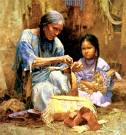 When my elder son and daughter approached their teens I got my daughter this book: Ready, Set, Grow!: A What's Happening to My Body? Book for Younger Girls , and this book for my son: What's Going on Down There: Answers to Questions Boys Find Hard to Ask . I truly thought this is the logical thing to do since they are growing up and I am positive they have many question and doubts about what is going on in their bodies. I did not want them to get their information from unreliable sources and I wanted an entry point to discuss these issues with them.
When my elder son and daughter approached their teens I got my daughter this book: Ready, Set, Grow!: A What's Happening to My Body? Book for Younger Girls , and this book for my son: What's Going on Down There: Answers to Questions Boys Find Hard to Ask . I truly thought this is the logical thing to do since they are growing up and I am positive they have many question and doubts about what is going on in their bodies. I did not want them to get their information from unreliable sources and I wanted an entry point to discuss these issues with them.I’ve put a great effort into choosing the right books. I ordered many, but decided to give them just these two books. I looked for books with simple and basic information, simple language, cartoon and not so graphical illustrations and scientific rather than social approach to sex education. The latter condition was because many books are American based and address the issue from the angle of “have sex but make it safe”. I thought it was too early to get into this discussion and too complicated to draw the cultural distinctions.
I was amazed by the angry calls and discussions I got from the mothers of my kids’ friends. They thought it was “inappropriate” to introduce children to such information. Some feared that this will “mess up” their kids’ heads. Others thought it was too soon to “open their eyes” to such issues. Others cautioned me against raising my children with such “Western” and “free” environment.
Was I wrong? I really don’t think so. I believe that these books or something similar should have been part of their school curriculum. It should not be left to the parents’ initiative and/or preference. Children should have sources for scientific and practical information about their sexual development. They should be able to turn to their parents and teachers as the primary reference for such information. Otherwise their alternatives are the hearsay, media, their imagination and most dangerous, the “bad” boys and girls in school! How can that be healthy or safe to our kids?
One of the mothers told me “sex is a private matter, should not be open for public discussion”! But so is going to the bathroom (sorry). Yet, they taught us in school all about the intestines and the digestive system. The children, at an early age know hygiene requirements. They can easily tell if they have urinary infection, constipation or diarrhea (very sorry). Do they have the same solid information about their reproductive system?
Lack of sex education at an early stage is the root cause to many of the problems adults face. By the time a young men or women are ready for marriage their heads are filled with superstitions, baseless anecdotes, myths, and unrealistic expectations. This contributes to many medical, psychological and social problems like infertility, impotence, sexual and gender identity disorders, domestic violence, divorce, infidelity .. and many others.
A mother told me that they will learn about all that in the Islamic Studies class. I don’t know about the current Islamic Studies curriculum, but the one I took had nothing of substance. I remember reciting the words (الجماع ، الاحتلام ، الحيض) and getting full grades in the tests without knowing what they meant. One time I asked my teacher about what (حيض) period meant. And she laughed and said “you’ll know when it comes to you” !!! Can you imagine the horror? Waiting for it to come!

Another told me: “when they are old enough they will ask us or find answers in books or the internet”!!! When is “old enough”? Which child in his/her right mind will come and ask their parents? How do we guarantee that the books, or even worse the internet sites, they seek will have the right information? What about the damage done till then?
My Question: What do you think about sexual education as a solid part of formal school education? What age/ grade school most appropriate?







 A healthy regular
A healthy regular 








